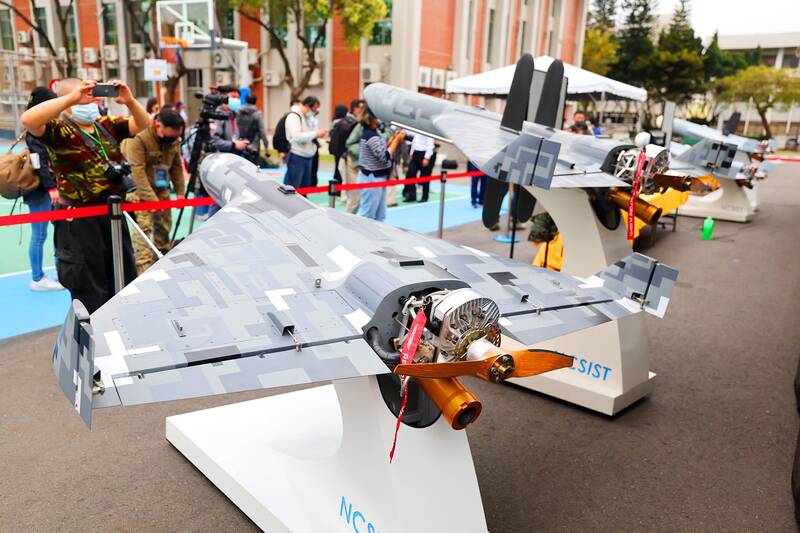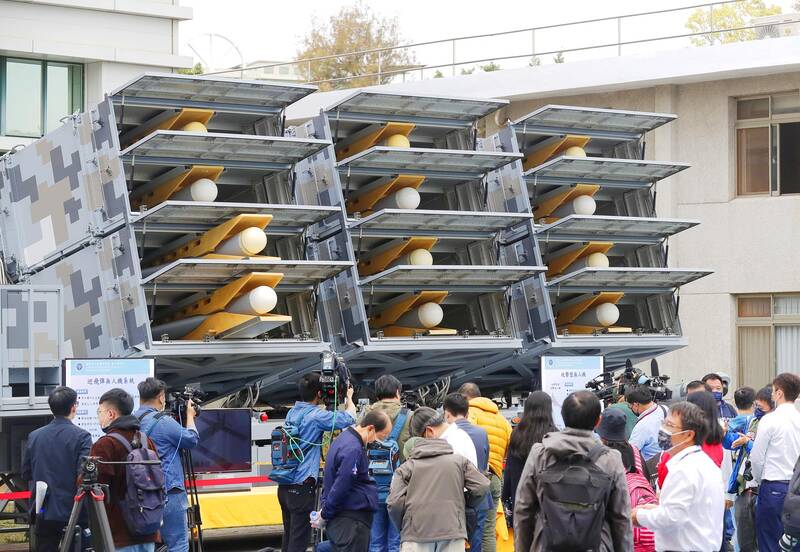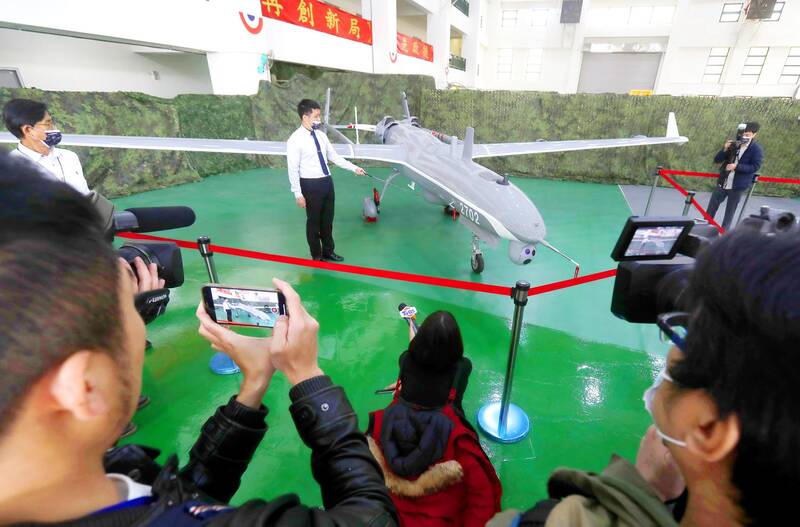Taiwan’s top military research body yesterday unveiled nine domestically developed drones in Taichung, including a loitering munition, or “suicide drone,” similar to the US-made AeroVironment Switchblade 300.
The surveillance and attack drones shown to the media by the Chungshan Institute of Science and Technology included the Albatross medium-range uncrewed aerial vehicle Nos. 1 and 2, and the Teng Yun 2 and Cardinal 2 and 3 indigenous uncrewed combat aerial vehicles.
The institute also unveiled a domestically made drone inspired by the AeroVironment Switchblade 300, which Ukrainian forces have employed in the country’s war with Russia.

Photo: CNA
Aeronautical Systems Research Division head Chi Li-pin (齊立平) told reporters that the miniature loitering munition has a range of 10km, can fly for 15 minutes and can fit inside a rucksack.
The device, which has a high-performance electro-optical and infrared sensor, can be carried by a single soldier and can destroy high-value, high-risk vehicles as well as target personnel, Chi said.
“It is like a large grenade capable of flying,” Chi said.

Photo: Chiang Ying-ying, AP
The “suicide” drone would be well suited for attacking coastal and near-shore enemy targets, he said, adding that it was compatible with Taiwan’s military needs with regards to conducting asymmetrical warfare against a much stronger rival.
Institute president Art Chang (張忠誠) said that the war in Ukraine had focused attention on drones and his institution has teamed up with Taiwanese companies to build a “national team” to develop military drones.
The military has announced a partnership with companies aimed at producing 3,000 drones next year.

Photo: Chiang Ying-ying, AP
Separately yesterday, Minister of National Defense Chiu Kuo-cheng (邱國正) said that the military would adjust its deployments in Kinmen County amid security concerns after a missing soldier was later confirmed alive in China.
Chiu made the comment on the sidelines of a legislative session while discussing the case of a private first class surnamed Chen (陳), who was confirmed by the government to be safe in China’s Xiamen after disappearing on Thursday last week.
Chen was reported missing from Erdan (二膽), a small islet in Kinmen less than 5km from Xiamen.
Asked if the military was worried that Chen’s presence in China could pose a security risk, Chiu said that the private’s access to confidential information was irrelevant because the military was going to take precautions one way or the other.
“We will make adjustments [concerning troop deployments] as we conduct a regular review of our deployments,” he said.
Despite widespread speculation over what happened and why Chen would leave Erdan, including that he might have fled to escape debts, no clear explanation of the case has been provided.
Asked why Chen left his post, Chiu had little to offer yesterday other than saying an investigation had not found that the soldier had disputes with superior officers before going missing.
Responding to a Reuters report the day before about a sharp increase in British exports of submarine parts to Taiwan, Chiu declined to comment directly, saying that the domestic submarine program faces many difficulties, but is going according to plan.
Additional reporting by Reuters

SECURITY: As China is ‘reshaping’ Hong Kong’s population, Taiwan must raise the eligibility threshold for applications from Hong Kongers, Chiu Chui-cheng said When Hong Kong and Macau citizens apply for residency in Taiwan, it would be under a new category that includes a “national security observation period,” Mainland Affairs Council (MAC) Minister Chiu Chui-cheng (邱垂正) said yesterday. President William Lai (賴清德) on March 13 announced 17 strategies to counter China’s aggression toward Taiwan, including incorporating national security considerations into the review process for residency applications from Hong Kong and Macau citizens. The situation in Hong Kong is constantly changing, Chiu said to media yesterday on the sidelines of the Taipei Technology Run hosted by the Taipei Neihu Technology Park Development Association. With

CARROT AND STICK: While unrelenting in its military threats, China attracted nearly 40,000 Taiwanese to over 400 business events last year Nearly 40,000 Taiwanese last year joined industry events in China, such as conferences and trade fairs, supported by the Chinese government, a study showed yesterday, as Beijing ramps up a charm offensive toward Taipei alongside military pressure. China has long taken a carrot-and-stick approach to Taiwan, threatening it with the prospect of military action while reaching out to those it believes are amenable to Beijing’s point of view. Taiwanese security officials are wary of what they see as Beijing’s influence campaigns to sway public opinion after Taipei and Beijing gradually resumed travel links halted by the COVID-19 pandemic, but the scale of

A US Marine Corps regiment equipped with Naval Strike Missiles (NSM) is set to participate in the upcoming Balikatan 25 exercise in the Luzon Strait, marking the system’s first-ever deployment in the Philippines. US and Philippine officials have separately confirmed that the Navy Marine Expeditionary Ship Interdiction System (NMESIS) — the mobile launch platform for the Naval Strike Missile — would take part in the joint exercise. The missiles are being deployed to “a strategic first island chain chokepoint” in the waters between Taiwan proper and the Philippines, US-based Naval News reported. “The Luzon Strait and Bashi Channel represent a critical access

Pope Francis is be laid to rest on Saturday after lying in state for three days in St Peter’s Basilica, where the faithful are expected to flock to pay their respects to history’s first Latin American pontiff. The cardinals met yesterday in the Vatican’s synod hall to chart the next steps before a conclave begins to choose Francis’ successor, as condolences poured in from around the world. According to current norms, the conclave must begin between May 5 and 10. The cardinals set the funeral for Saturday at 10am in St Peter’s Square, to be celebrated by the dean of the College